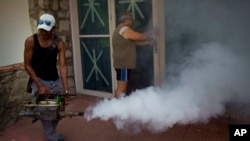Cuba said on Thursday 1,847 residents had so far contracted the mosquito-borne Zika virus, warning that certain provinces on the Caribbean island still had high rates of infestation despite a series of measures to stave off the epidemic.
At the start of the global Zika outbreak, Cuba managed for months to fend off the virus that can cause microcephaly in babies as well as Guillain-Barre syndrome, even as neighboring territories like Puerto Rico were hard hit.
The Communist-run country called out the military to help fumigate, activated neighborhood watch groups to check for places with standing water where mosquitoes breed, and instituted health checks at airports and other entry points to the island.
"Even though we have managed to reduce the cases of infestation ... there are still provinces like Havana, Guantanamo, Cienfuegos and Camaguey, with big risks and rates of infestation," the head of the Civil Defense's Department of Disaster Reduction, Gloria Gely, was quoted as saying by state-run media.
Although generally a mild disease, the virus is a particular risk to pregnant women as it can cause microcephaly - a severe birth defect in which babies are born with abnormally small heads and underdeveloped brains.
Gely did not detail how many of the cases were contracted locally nor whether there had been any instances of babies born with microcephaly on the island of 11.2 million inhabitants.
There is no preventive treatment against Zika, but drug companies are rushing to develop a vaccine. The virus has spread to more than 60 countries and territories since the current outbreak was identified in Brazil during 2015.





